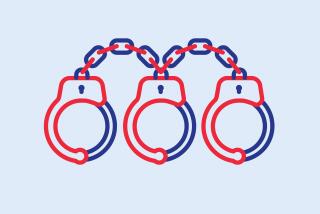This Is Two-Tiered Justice
- Share via
The important drug question is not, “What did George sniff and when did he sniff it?” It is, “How do we handle the legion of nonviolent drug offenders who are now crowding our prisons?” This long-overdue discussion has become an electrified third rail of American politics--a subject neither party has been willing to touch for fear of being incinerated on contact. Bush can change that by redirecting the media spotlight off the issue of his past substance abuse and onto an issue of actual substance--namely, the racial and economic injustice of our present drug policy.
In the name of toughness in the drug war, mandatory federal sentences of five years are meted out to anyone caught with more than five grams of crack cocaine. For the same sentence, you would need to possess 500 grams of the more upscale powder form of the drug. The result has been a two-tiered sentencing system, disproportionately affecting African American men, who are five times as likely to be arrested for drug violations than white men, even though their rate of illegal drug use is about the same. Despite a decline in violent crime, a record 1.82 million inmates are now in our state and federal jails. And of all federal prisoners, 60% are there for violating drug laws.
“Bush should take a compassionate look,” Jesse Jackson told me, “at the thousands of young Americans paying the price in our jails for a mistake that--if he made it--did not mar his life.” Jackson, for one, intends to use this moment to spotlight the horrors of the “jail-industrial complex which is driven by the incarceration of nonviolent drug users.”
And there are many conservative voices calling for mandatory minimum sentencing to be repealed or at least reexamined--including Supreme Court Justice Anthony Kennedy, criminologist John DiIulio and former Reagan Atty. Gen. Ed Meese.
“The different sentencing for crack cocaine and powder cocaine is something that there’s no doubt needs to be addressed,” Dan Bartlett, Bush’s campaign spokesman, told me from Austin. “We do not have mandatory sentencing down here because we don’t want to handcuff judges.” But by signing legislation in 1997 that made it possible for judges to send to jail even first-time nonviolent offenders carrying less than one gram of cocaine, Bush has opened himself to charges of a double standard--if, that is, he ends up admitting that the youthful mistakes he has alluded to include being in possession of less than one gram of cocaine.
It would be a truly defining moment if Bush were to use any personal confession he might make not only to express his regret but to decry our present drug policy that makes second chances and learning from one’s mistakes nearly impossible. If he chooses instead to stand behind the “zero tolerance” of our $40-billion-a-year war on drugs--which is every day looking more and more like a domestic Vietnam--and continues to advocate harsh sentences for first-time nonviolent offenders, then he will expose himself as the worst kind of hypocrite, forfeiting any claim of moral superiority over the man he seeks to succeed.
More to Read
Sign up for Essential California
The most important California stories and recommendations in your inbox every morning.
You may occasionally receive promotional content from the Los Angeles Times.













